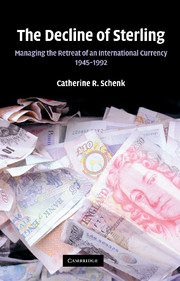Crossref Citations
This Book has been
cited by the following publications. This list is generated based on data provided by Crossref.
Kay, R. P.
2011.
The geopolitics of dependent development in Central Africa: race, class and the reciprocal blockade.
Commonwealth & Comparative Politics,
Vol. 49,
Issue. 3,
p.
379.
Rogers, Chris
2011.
Economic Policy and the Problem of Sterling under Harold Wilson and James Callaghan.
Contemporary British History,
Vol. 25,
Issue. 3,
p.
339.
Helleiner, Eric
and
Malkin, Anton
2012.
Sectoral Interests and Global Money: Renminbi, Dollars and the Domestic Foundations of International Currency Policy.
Open Economies Review,
Vol. 23,
Issue. 1,
p.
33.
PEDEN, G. C.
2012.
SUEZ AND BRITAIN'S DECLINE AS A WORLD POWER.
The Historical Journal,
Vol. 55,
Issue. 4,
p.
1073.
2012.
A Companion to Harry S. Truman.
p.
598.
Clift, Ben
and
Tomlinson, Jim
2012.
When rules started to rule: the IMF, neo-liberal economic ideas and economic policy change in Britain.
Review of International Political Economy,
Vol. 19,
Issue. 3,
p.
477.
Rasmussen, Kathleen Britt
2012.
A Companion to Harry S. Truman.
p.
303.
O’Hara, Glen
2012.
Governing Post-War Britain.
p.
53.
Schenk, Catherine R.
2013.
The Global Gold Market and the International Monetary System from the late 19th Century to the Present.
p.
17.
Schaufelbuehl, Janick Marina
2013.
The Global Gold Market and the International Monetary System from the late 19th Century to the Present.
p.
159.
Stockwell, Sarah
and
Butler, L. J.
2013.
The Wind of Change.
p.
1.
Smith, Simon C.
2013.
The Wind of Change.
p.
235.
Cohen, Benjamin Jerry
2014.
Will History Repeat Itself? Lessons for the Yuan.
SSRN Electronic Journal,
He, Dong
and
Yu, Xiangrong
2014.
Network Effects in Currency Internationalisation: Insights from BIS Triennial Surveys and Implications for the Renminbi.
SSRN Electronic Journal,
MARK, CHI-KWAN
2014.
Development without Decolonisation? Hong Kong's Future and Relations with Britain and China, 1967–1972.
Journal of the Royal Asiatic Society of Great Britain & Ireland,
Vol. 24,
Issue. 2,
p.
315.
Truman, Edwin M.
2014.
The Federal Reserve Engages the World (1970-2000): An Insider's Narrative of the Transition to Managed Floating and Financial Turbulence.
SSRN Electronic Journal,
Defraigne, Jean-Christophe
2014.
Interpreting China as a Regional and Global Power.
p.
293.
Lee, Jong‐Wha
2014.
Will the Renminbi Emerge as an International Reserve Currency?.
The World Economy,
Vol. 37,
Issue. 1,
p.
42.
de Paiva Abreu, Marcelo
2014.
A ‘blank cheque'? Portuguese Second World War sterling balances, 1940–73.
The Economic History Review,
Vol. 67,
Issue. 2,
p.
535.
Gardner, Leigh A.
2014.
The rise and fall of sterling in Liberia, 1847–1943.
The Economic History Review,
Vol. 67,
Issue. 4,
p.
1089.





